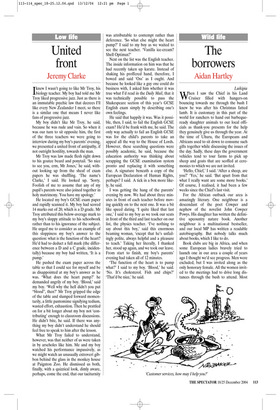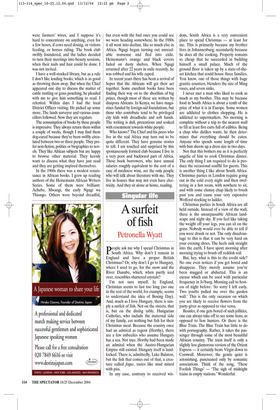The borrowers
Aidan Hartley
Laikipia
When I saw the Chief in his Land Cruiser filled with hangers-on bouncing towards me through the bush I knew he was after his Christmas fatted lamb. It is customary in this part of the world for ranchers to hand out barbequeready slaughter animals to our local officials as thank-you presents for the help they genuinely give us through the year. At the time of Uhuru, the Europeans and Africans used to sit down to consume such gifts together while discussing the issues of the day. Sadly, these days the government vehicles tend to tour farms to pick up sheep and goats that are scoffed at ceremonies to which we are not invited.
‘Hello, Chief,’ I said. ‘After a sheep, are you?’ ‘Yes,’ he said. ‘But apart from that what I really want are some more books.’ Of course, I realised, it had been a few weeks since the Chief’s last visit.
For the African outback our area is amazingly literary. One neighbour is a descendant of the poet Cowper and nephew of the novelist John Cowper Powys. His daughter has written the definitive upcountry nature book. Another neighbour is a multinational bestseller, and our local MP has written a readable autobiography. But nobody talks much about books, which I like to do.
Book clubs are big in Africa, and when some European ladies bravely tried to launch one in our area a couple of years ago I thought we’d see progress. Men were excluded, but I was invited along as the only honorary female. All the women invited to the meetings had to drive long distances through the bush to attend. Most were farmers’ wives, and I suppose it’s hard to concentrate on anything, even for a few hours, if cows need dosing, or visitors feeding, or horses riding. The book club swiftly foundered, and the ladies decided to turn their meetings into beauty sessions, when their nails and hair could be done. I was not invited.
I have a well-stocked library, but as a rule I don’t like lending books, which is as good as throwing them away. But when the Chief appeared one day to discuss the matter of cattle rustling or grass poaching, he pleaded with me to give him something to read. I relented. Within days I had the local District Officer visiting. He picked up some more. The lands surveyor and various councillors followed. Now they are regulars.
The consumption of books by these people is impressive. They always return them within a couple of weeks, though I may find them dog-eared because they’ve been swiftly circulated between two or three people. They prefer non-fiction, politics or biographies to novels. They like African subjects but are happy to browse other material. They keenly want to discuss what they have just read and they are getting inspired themselves.
In the 1960s there was a modest renaissance in African books. I grew up reading authors of the Heinemann African Writers Series. Some of them were brilliant: Achebe, Mwangi, the early Ngugi wa Thiongo. Others were beyond dreadful, but even with the bad ones you could see we were heading somewhere. In the 1980s it all went into decline, like so much else in Africa. Ngugi began turning out unreadable nonsense and fled into exile. Heinemann’s orange and black covers faded on dusty shelves. When Ngugi returned after 22 years in exile recently, he was robbed and his wife raped.
In recent years there has been a revival of hopes that the Africans will get their act together. Some excellent books have been finding their way on to the shortlists of big prizes, though most of these are written by diaspora Africans. In Kenya, we have magazines funded by foreign-aid foundations, but those who contribute tend to be privileged city kids with dreadlocks and soft hands. The writing is dull, pretentious and soaked with resentment towards white people.
Who knows? The Chief and his peers who live in the real Africa may turn out to be quite different. They have genuine stories to tell. I am touched and surprised by this spontaneously formed club because I live in a very poor and backward part of Africa. These book borrowers, who have annual salaries roughly equivalent to the cost of a case of mediocre wine, are the only people who will talk about literature with me. They live in houses that may not even have electricity. And they sit alone at home, reading.


















































































 Previous page
Previous page